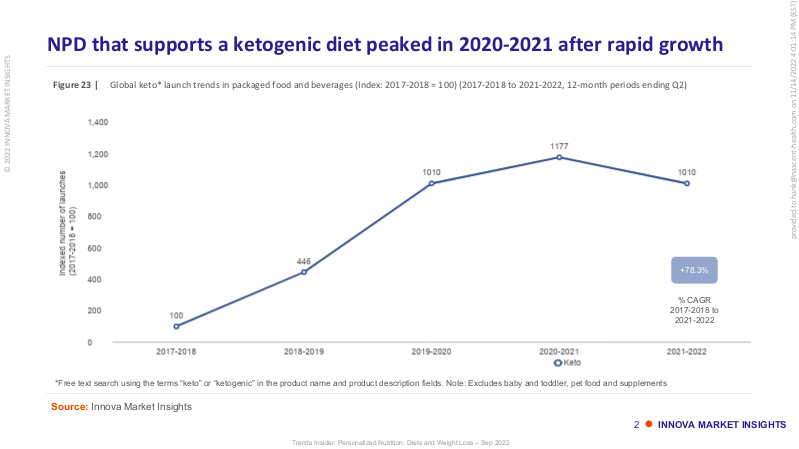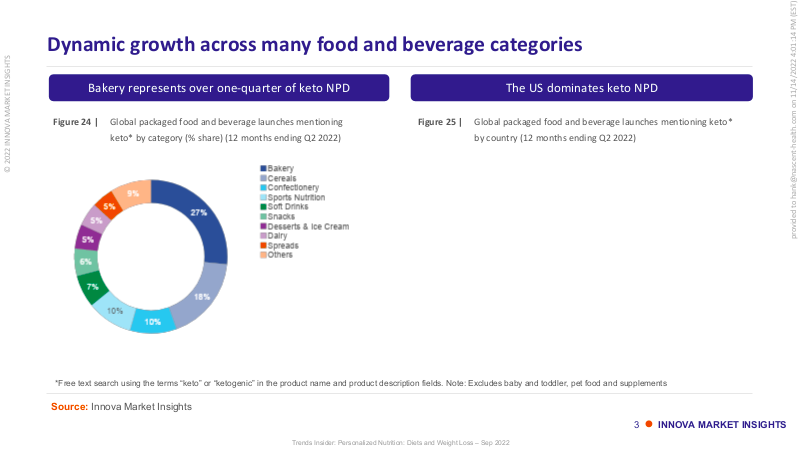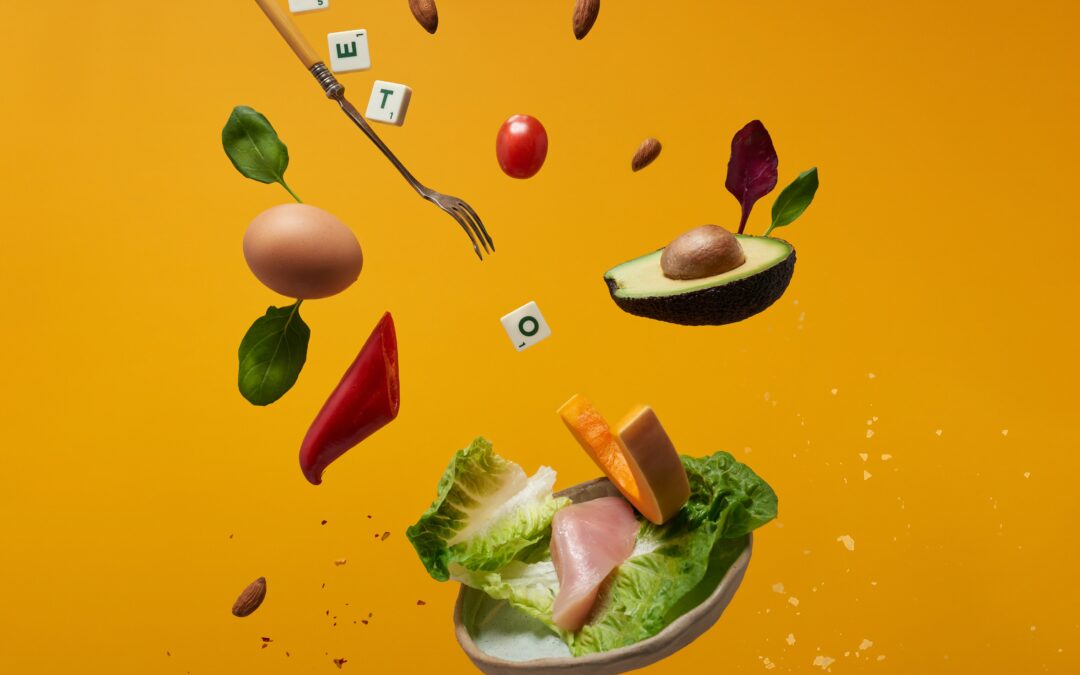Most diets come and go with the seasons, but one fad diet has only grown in its popularity, even forcing major brand names to hop on the “Keto Diet” bandwagon…
The ketogenic diet is a low-carb, high-fat method that is similar to the less new, yet familiar, Atkins diet. Keto’s appeal, however, is derived from its emphasis on foods that are high in fat like red meat, avocados, cheese, nuts, and a variety of other “taboo” foods not commonly approved by strict diet plans. Keto’s popular approach forces one to drastically reduce their carbohydrate intake — like grains, fruit, and traditional sugars — and replace it with fat to achieve a state of ketosis. In this metabolic state, the body is able to burn fat more efficiently for energy.
Over the past several years, followers of the diet have been able to keep the keto craze going, thanks in part to some of the diets’ reported and studied results, including:
- Excess fat loss
- Improved insulin sensitivity
- Reduced levels of hemoglobin A1C
Food and beverage manufacturers have followed suit. Innova Market Insights reports that keto-friendly food and beverage products peaked in 2020-2021 after its marked inception in 2017, but still continues to experience remarkably strong growth in the number of new launches each year.

Amongst the various food categories, baked goods are leading the way in adoption of keto. Also according to Innova Marketing Insights, an outstanding 27% of new product launches that mention “keto” fall into the bakery category.

In addition to baked goods and cereals, sports nutrition also has a 10% stake in keto-friendly product launches. This is in line with reports that 25% of US sports nutrition consumers are seeking out high sources of protein made with real, natural ingredients and low/no/reduced sugar — qualities that perfectly describe what keto dieters are looking for.
Although seemingly ironic at first, in recent years keto-friendly “Sweets” have risen in prominence since the craze began. This includes a variety of categories including soft drinks, snacks, desserts and more. Sweetening a keto-friendly product requires sugar reduction, and replacement with more natural solutions. Companies have shifted their traditional sweetening method in baked goods, cereals and even sports drinks to natural sweeteners like stevia. Stevia’s high intensity sweetness and zero calories allows manufacturers to formulate new “keto” products without sacrificing taste.
Major Brands Shifted to Keto-Friendly Products
The keto craze experienced a meteoric rise with no signs of stopping. So naturally, big-name, diet-plan brands began to shift their focus to keto-friendly product lines. Trusted names like SlimFast and Atkins created these niche products dedicated to their already low-carb dieters, but with more of an emphasis on high-fat intake — in other words, the keto method.
Challenge: Foods High in Carbs & Sugars Are Not Typically Keto-Friendly
The inherent challenge of sweetening keto-friendly products lies in the method’s strict low-carb directive. In fact, most common types of sugary treats and some sugar-free candies are either reduced or otherwise eliminated entirely, according to the keto diet.
Below is a list of common non keto-friendly foods:
- Sugary Foods: soda, fruit juice, smoothies, cake, ice cream, candy, etc.
- Grains or Starches: wheat-based products, rice, pasta, cereal, etc.
- Fruit: all fruit, except small portions of berries like strawberries
- Beans or Legumes: peas, kidney beans, lentils, chickpeas, etc.
- Root Vegetables & Tubers: potatoes, sweet potatoes, carrots, parsnips, etc.
- Low-Fat or Diet Products: low-fat mayonnaise, salad dress, condiments
- Some Condiments or Sauces: barbecue sauce, honey mustard, teriyaki sauce, ketchup, etc.
- Unhealthy Fats: processed vegetable oils, mayonnaise, etc.
- Alcohol: beer, wine, liquor, mixed drinks
- Some Sugar-Free Diet Foods: sugar-free candies, syrups, puddings, sweeteners, desserts, etc.
How to Formulate Keto Products
Formulating for keto products will typically follow a simple, low net-carb calculation. If a product has 10 grams of total carbs, certain carbohydrates that the keto diet permits will be netted out from the calculation. Below is an example of how we may reduce the 10 grams of carbs:
- 4 grams of fiber
- 2 grams of allulose
- 3 grams of sugar alcohol
When subtracting these keto-friendly ingredients, your resulting net carbs in this case would equal only 1 gram. Stevia is a recommended and particularly popular sweetener for keto, but ingredients like allulose and fibers like resistant dextrin, inulin, and certain oligosaccharides may be considered as well. Note that when formulating with fibers, they aren’t as readily digestible so you’ll want to stay below 10 to 15 grams per dosage.
So, What’s Our Solution?
Replace Traditional Sugars With Stevia:
Lowers Your Carbs, Calories & Sugars
Keto formulas typically try to reduce the sugar as much as possible. So if you have no other sweeteners in your formula, a good starting stevia to use for significant sugar reduction is Reb D. It is lower cost than Reb M and very close in overall taste. Unless your product needs to be crystal clear, Reb D would be a great choice. A lower cost option would be to use Reb A 98 at the highest level possible and then top off with Reb D. This would be a good option if you have other sweeteners in your product, too.
As an example, in a beverage you may start with 360ppm of Reb A 98 and adjust the use level up or down depending on the desired taste. Our testing has found that 360ppm of Reb A 98 can replace 6-7 sucrose equivalents and not have many off-notes. However, if you want to match the taste profile of full sugar very closely, a use level of ~200ppm can replace about 5 sucrose equivalents.
Visit a HOWTIAN exhibition at an upcoming industry event to experience our keto solutions in action.
In addition to our line of stevia extracts, HOWTIAN offers a variety of solutions for food & beverage manufacturers developing keto-friendly products. Our DGS sweetener blends utilize a mix of replacement carbs that would be netted out in a true ketogenic formula. HOWTIAN’s DGS series is an ideal drop-in solution for a 1:1 replacement of sugar in most applications that require bulking.
Alternatively, allulose is a rare sugar approved in select countries and exempted from the sugar labels in countries like the U.S. and Mexico. Similar to allulose, erythritol is a favorite low-calorie sweetener choice for many food & beverage makers as it provides a sweetness level that can largely replicate sugar and that is higher than that of allulose. Both act as strong complements to stevia, and can be coupled to develop optimized sugar replacement solutions for different applications, especially when bulking agents are required. Maltitol, xylitol and sorbitol are additional options to consider, as well. In cases where bulking is not a need, stevia will be your sweetener of choice for formulating keto-friendly products.
Sample Formula: Our New Keto-Friendly Sugar Cookies
As an illustration of sugar reduction in action for keto, we developed a formulation for sugar cookies with our keto-friendly DGS sweetener blends:

| Full Sugar | No Sugar Added | |
| Flour, All-Purpose | 42.38 | 42.38 |
| Baking Powder | 0.36 | 0.36 |
| Salt | 0.18 | 0.18 |
| Butter, Unsalted | 25.64 | 25.64 |
| Sugar, Granulated | 22.62 | — |
| Egg, Large | 7.54 | 7.54 |
| Vanilla Extract | 1.27 | 1.27 |
| HOWTIAN DGS Series | 22.67 | |
| Total | 100g | 100g |
Contact Us
If you need help with reformulating for a keto-friendly product or application, HOWTIAN application engineers are available to help meet your challenges. We can assist in developing a customized keto-friendly strategy for your product(s) with cost-effective solutions and reliable supply. Please contact us to learn more.

